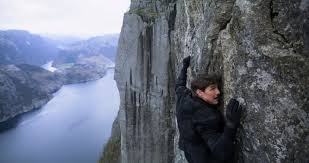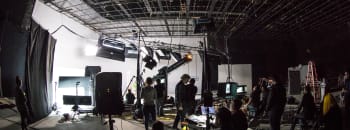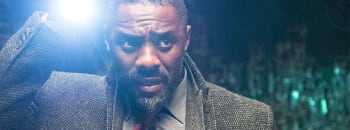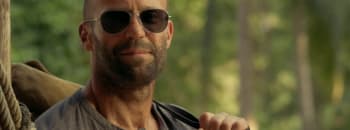Mission: Impossible 7 to film in Norway
KFTV Talks to Matt Spooner, production safety supervisor for Mission: Impossible 7 about the appeal of Norway and maintaining health & safety standards on set
By Chris Evans 10 Aug 2020

Major Hollywood blockbuster Mission: Impossible 7, starring Tom Cruise, is expected to start filming again from next month in Norway, the UK and Poland.
Strict health and safety protocols have been put in place due to Covid-19 to ensure the production runs smoothly. Here Matt Spooner talks about his role as Covid Supervisor on the project.
What is the latest situation with filming of Mission: Impossible 7?
We were just about to start filming in Italy back in February when Covid kicked off, and that was that. We put the cameras back in the office and went home again. So, we’re just getting them out of the box again, with the aim of filming in September in Norway.
So, Norway first then the UK?
Yeah, we have the agility to flip to one or the other. The producers are trying to make the schedule as Covid secure as possible. We’re looking to head to Norway in September, but haven’t got a definitive start date. Norway is a safe place to film and we’ve got to make sure we maintain their stringent health and safety standards. So, everyone will be tested before they fly and when they arrive in the country. We’ll all be staying in group accommodation on the west coast of the country.
There is a huge filming industry emerging in Norway because they’ve got so many different landscapes. You could conquer an entire script in Norway because there are so many different places you could shoot – rugged mountainous landscapes, beautiful green North Sea coast and various pretty cities, like Oslo. Then you’ve got arctic wildernesses up north. It’s a very versatile country. Marvel and Bond were there last year and Mission: Impossible 6 the year before.

Tom Cruise scaling Pulpit Rock in Norway for Mission: Impossible - Fallout
Will it be difficult to manage all the action sequences under Covid-19 restrictions and guidelines?
It’s easy to go down a rabbit hole with this sort of thing. The protocols are pretty straightforward in essence. Keep away from each other, wear masks, keep things clean and do routine testing. By doing those four things you set up an effective ring-fence. So, whether you’re doing an action or talking heads type picture, no one version is more arduous than another in this exercise.
What about managing crowds?
Crowds is probably the ultimately difficult thing in a production because you’ve got the safety of the crowd and the crew to consider, and all of the initial infrastructure you need. There’s also the consideration of the public health implications - you’re going to have all these people together on set and then send them away again, regardless of whether they pick Covid up on your set, from the crew or one another, you can still have complications. That’s going to be tricky to manage. You have to do that work responsibly. It can prove to be extremely costly and it’s not been proven yet how effective it can be. So, getting bang for your buck has yet to be proven.
Are you considering the bubble approach?
We haven’t adopted the bubble approach yet. We are still in conversation about the best approach. The new Jurassic World production have adopted the bubble method. All the cast are in one big bubble and have included some stunt performers in that so they can train and do those sequences in front of camera. Plus, they’re all sharing accommodation. That’s one way to do it. If you have a group who will regularly need to break social distancing and work without face coverings you can put them in a bubble, ring fence them from the rest of the production and make sure you maintain it. However, If someone else on the project breaks the link somewhere, visits the bubble when they’re social distancing within another bubble, you’ve linked those two bubbles together. It can be tricky, but you just need to put a bit of thought into it. Key to it is basic stuff like communication, getting an email out to everyone, getting training to everyone to say don’t go in these places, this is where a vulnerable team is working etc.
Have you got teams of Covid people on set? Have you trained some of the production staff to be Covid team members?
I am a little nervous about productions that just train someone up. I know some productions have taken that route. What we’ve done on Mission: Impossible is attach an extra technical Covid person as a compliance officer with a medical background – a nurse who did things for the Office for National Statistics and worked in the Nightingale hospital. So they’ve got a really specific Covid background. We also added in two location assistants who have gone around supporting with putting up signs, hand sanitiser refilling machines etc. Then there are a couple of additional medical people. So, in that sense I supposed it is a slightly larger team than it was previously on other Mission: Impossible films. But we haven’t got a specific Covid team because we’re trying to integrate everything we do into our workflow, rather than it being a separate consideration.
We have also within departments nominated an existing member of staff or crew as a departmental covid co-ordinator, and that’s the person we send all the communications to for it to be distributed out to the department. That’s also the person crew members call should they get unwell, which will trigger the flag system stopping them coming into work.
We’ve also empowered departments to take some responsibility for their decision making, so they put it in to their daily work processes. Whereas we in this central safety role have oversight of this and are making sure everything we do is according to best practice and meets the legal requirements. We audit it as well to make sure it meets Paramount standards.
Does the Covid supervisor’s role vary depending on the size and type of project?
Overall, it depends what the production has in place already, as that will dictate what extra support it needs. If they’ve already got a very established safety department or team, then there’s a chance that Covid supervisor they’re looking to bring on won’t need the same background. But if they don’t have the in-house oversight then my recommendation is that the Covid supervisor or manager they bring in has a bit more safety experience to make sure they’re doing the risk assessments properly and know how they’re going to be evaluated should there be an issue.
How much power should/does a Covid supervisor have?
In my mind there shouldn’t be an authority issue about it. The Covid supervisor role is about good communication and having a report line direct to the top (the people ultimately responsible for the risk) and saying to them because of the actions of x, y and z there is now a greater vulnerability for these groups of people and they need to be protected because they don’t know the mistakes they’re doing and therefore we need more money to train them, employ more people to support them, or we’ve got the wrong people on the job because they don’t know how or want to follow the rules. That is sadly the case sometimes.
Has your role changed considerably?
Enormously. My official title is production safety supervisor, but my role has morphed into not only taking on a safety role, but oversight of the Covid issues, as well as an element of risk management – how are we making this production as resilient as possible against the threat of Covid.
Plus, tertiary stuff like government reaction to issues in other countries; how is the country we’re working in reacting to the situations in other countries; And making sure the places you’re filming in are as guaranteed as possible.
"It used to be the case you’d be well looked after by the production service providers and film commissions and kept in a bubble. But now that’s not the case, public health and safety is the absolute priority. Quite rightly we play second fiddle. Trying to make your production as resilient and secure as possible against that decision-making process is a tricky business."
Yes, there’s a lot to consider isn’t there - logistics, travel, crew, govt rules etc?
Absolutely. The art of delegation comes into its own. There is in the film business a way that safety is built into the production and what we do, but it hasn’t historically been led by the safety dept, it’s been led by individual specialists in each dept (HoDs etc). Now there is a need for those safety departments to build a bit of a greater position so they can lead.
You can say you’ve done risk assessment for painting a particular wall, but now need to build into that how you’re going to do the Covid stuff with it, and if we don’t come into work tomorrow because this area goes into lockdown, how are you going to make it safe, and then how does this affect all your other protocols? Just joining the dots is a real exercise, and it’s an enormous effort. But that is borne by everyone on the show. That’s the only way to achieve it.
"Everyone on this production has to buy into this message and effort. Because if just one person decides to go against it and take risks outside the workplace or doesn’t follow the requests made in the training sessions, the whole house of cards will fall down."
It’s a difficult task, which is why we have so many layers of safety in these productions. The basic rules (as of August 10) in the UK are you don’t need to wear a mask in public and try to stay at least a meter apart. But in production, it’s facemasks wherever you go all the time to accommodate for others making mistakes or not following the rules. Then 2 meters at all times and the fixed team working system with further safeguards. Plus doing the routine testing is yet another way to support that. Not only does that give you an idea of how effective your safety management systems are, but also tells you if you have a reservoir of disease in there, and you can react to that. So, it’s not only an auditing tool, but also a proactive measure.
Do you have to keep adapting your approach?
You have to be able to turn on a 10 pence piece and have back-up in place. It’s like a weather cover system, that same model of scheduling – if we can’t do this, can we do that instead? Also knowing your vulnerabilities. If we can’t do something on a certain day, we’ve got nothing to shoot, and so make sure the budget is shored up against that. You’ve got to be on top of that.
What about adapting to guidelines in other countries?
My advice is that corporations should set a high standard and that way wherever they travel they’re adhering to a set of best practices that exceed local requirements. It’s not just about meeting legal requirements, regulations and standards, it’s about protecting your business enterprise. If you set high standards, your enterprise has a far higher likelihood of seeing it through to the end.
"If you choose to go to a country where you adhere to a set of protocols that aren’t as stringent as those elsewhere you run the risk of not being allowed into other countries."
What about dealing with crew from different countries?
You’ve got to adapt. It’s all about travel corridors and exemptions provided to crew on features and high-end TV for the workplace side of things. Obviously, crew members need to maintain quarantine protocols outside of the workplace too, so they are allowed to go back and forth to identified areas.
How do you see the landscape changing in the coming months?
I would love to know the answer. What’s on all our minds is as the flu season starts we have to behave responsibly. And if the advice is to all go back into lockdown, that’s what we’ll do. Productions have to be prepared for that. There’s still a risk to life with everything going on. We need to make plans for a sudden shutdown – how quickly can we react, shut everything down and be safe.
The above will form part of a bigger report that KFTV is putting together about the roles and responsibilities of Covid Supervisors and their teams on film and TV productions…
Latest news & features
Featured profiles
Promote your services with KFTV
Choose from three profile types - Basic, Silver and Gold
Create ProfileWe offer a range of display advertising opportunities.
Learn More


